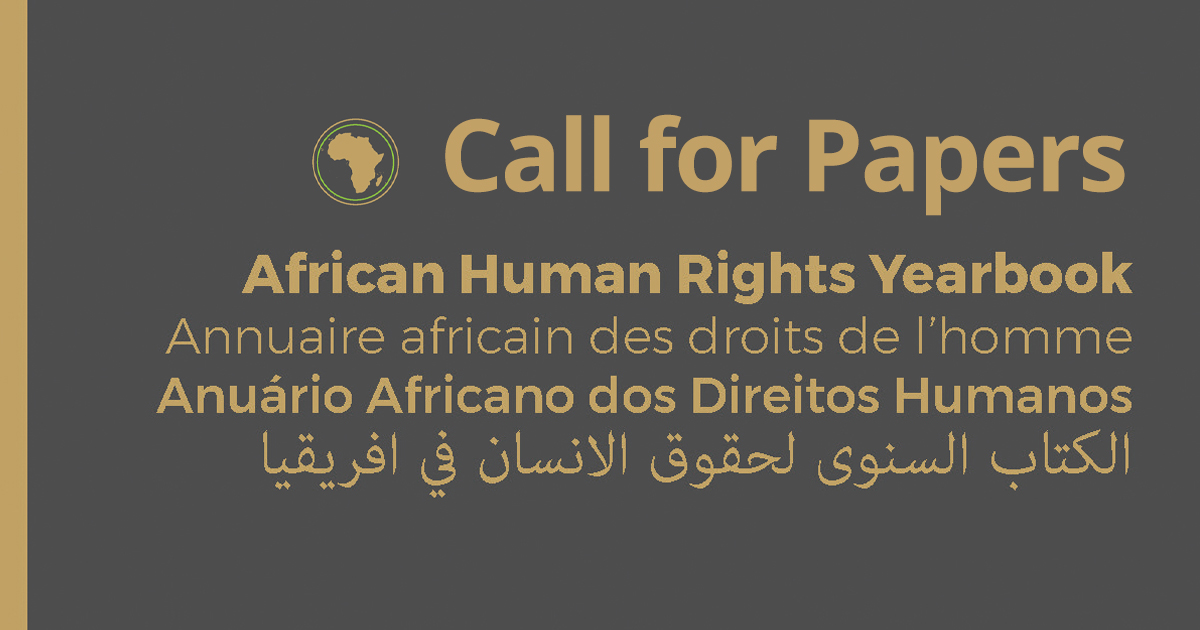INVITATION FOR CONTRIBUTIONS
We invite abstracts for articles and case discussions proposing to make ground-breaking academic-style contributions to the human rights discourse in Africa. Although the contributions are expected to take a continental (African) approach to the issues they cover, country-specific or sub-regional level case studies that relate to the African regional human rights system will also be considered. In so far as methodology is concerned, contributions adopting multidisciplinary and empirical approaches are highly encouraged.
BACKGROUND TO THE YEARBOOK
The African Court on Human and Peoples’ Rights (the Court), the African Commission on Human and Peoples’ Rights (the Commission), and the African Committee of Experts on the Rights and Welfare of the Child (the Committee) are pleased to announce the call for papers for the seventh volume of the African Human Rights Yearbook (AHRY). The AHRY has so far published six volumes since 2017, when the first volume comprising 17 articles was published. This joint publication, which contains contributions in English, French, Portuguese and Arabic, has been initiated within the framework of the complementarity relationships among the three institutions.
A. Articles focused on aspects of the African human rights system/
African Union human rights standards
In this section, the call is for articles about the African human rights system or African Union human rights standards, including their domestic application and interpretation. Authors are, in particular, encouraged to explore the domestic impact of African Union human rights treaties including the African Charter on Human and Peoples’ Rights and its Protocols, and the African Charter on the Rights and Welfare of the Child. Authors are equally encouraged to explore the impact, at the domestic level, of cases decided by the three institutions (the Commission, the Court and the Committee).
B. Articles related to the theme of the Year 2023: “Acceleration of African Continental Free Trade Area (AfCFTA) Implementation”
In this section, we invite articles that focus on the African Union’s theme of the year, which for 2023 is: “Acceleration of African Continental Free Trade Area (AfCFTA) Implementation”. Authors are encouraged to explore issues related to broader human and peoples’ rights arising from the normative and institutional framework establishing the AfCFTA and its impact on specific rights such as the right to freedom of movement and choice of residence, the right to participation in the decision-making process related to the AfCFTA, trade liberalisation and the right to free enterprise of small business holders, the right to work, the right to social security and social assistance, women’s rights protection in the context of AfCFTA implementation, the rights and participation of marginalised groups including persons with disabilities, sexual minorities, older persons, the youth and indigenous communities.
C. Case Commentaries
In view of the need for more critical scholarly reflection and wider dissemination of the growing jurisprudence of the three organs, this section of the Yearbook invites critical propositions to analyse and improve case law. Commentaries may be on a single decision, or on the case law of one of the three organs, or provide perspectives on the case law of the three organs, jointly (by for example looking into cross-cutting jurisprudential issues, and complementarity). Authors should consult recent decisions and judgments of the Commission, the Court and the Committee on their respect.
SUBMISSION OF ABSTRACTS AND TIMETABLE
Abstracts should be of no more than 400 words to be submitted, before or by 15 April 2023, together with the indication of the author’s professional qualifications and position via Submittable (https://centreforhumanrights.submittable.com/submit). Abstracts should set out: (i) the title of the article or case discussion, (ii) a short description of the topic to be addressed and the issues to be explored: (iii) the methodological approach taken; (iv) the anticipated findings or insights; and (v) an explanation of how the article or case discussion aims to make a contribution to existing knowledge/the current discourse.
Any questions on this call for papers should be directed to ahry@up.ac.za
A selection panel will consider the proposals and, by 15 May 2023, inform only the selected authors of the outcome. On acceptance of a proposal by the panel, the selected authors will be invited to submit a full draft article or case discussion, together with an abstract of 200 words, by 31 July 2023. The papers will then undergo a double-blind peer review process. Following the review, the authors will receive comments, which they will be expected to incorporate with a view to returning the final paper by 30 September 2023.
Accepted papers will be published in the seventh volume of the Yearbook, which is expected to appear in December 2023.
SUBMISSION GUIDELINES
- The submission must be original and not have already been published or submitted elsewhere.
- Articles should be between 8 000 and 10 000 words (including footnotes) in length.
- Case comments should be between 5 000 and 8 000 words (including footnotes) in length, and should include web links to cases cited.
- Contributions may be submitted in Arabic, English, French or Portuguese; and should be edited for language before submission.
- Use UK English for papers submitted in English.
- Please adhere to the Pretoria University Law Press (PULP) style guidelines, www.pulp.up.ac.za/images/files/publish_with_pulp/Styleguidelines%202018.pdf.
Please also refer to previous volumes of the Yearbook to familiarise yourself with the in-house style.
REMUNERATION
Contributions to the African Human Rights Yearbook are not remunerated. However, in recognition of their intellectual work and the value it adds to the Yearbook, authors of finally accepted papers will be added to a database of thematic experts of the African Court, the African Commission, and the Children’s Committee.


